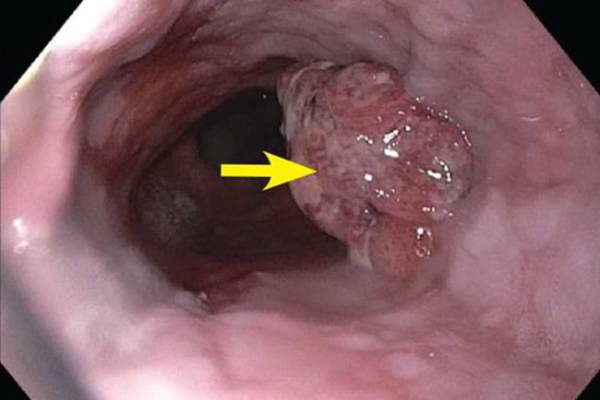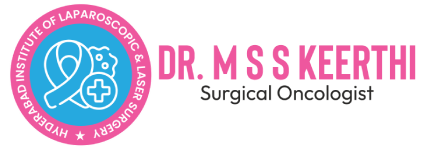Esophagus cancer is a serious condition affecting the esophagus, the tube that connects the throat to the stomach. Early detection and expert treatment are crucial for better outcomes. Dr. M.S.S. Keerthi is a highly skilled Surgical Oncologist in Hyderabad with over 15 years of experience in treating various types of cancers, including esophagus cancer. As a Sr. Consultant Surgical Oncologist and Laparoscopic & Robotic Surgeon at Tulasi Hospital, Secunderabad, Dr. M.S.S. Keerthi has helped thousands of patients with advanced cancer care.
What is Esophagus Cancer
Esophagus Cancer, also known as esophageal cancer, is a malignant tumor that originates in the cells lining the esophagus, which is a muscular tube connecting the throat (pharynx) to the stomach. This cancer can be a serious and life-threatening condition if not diagnosed and treated early. Here’s a detailed overview of esophagus cancer:

Esophagus Cancer Causes:
- Chronic Irritation from Acid Reflux (GERD): Gastroesophageal reflux disease (GERD) can lead to chronic irritation of the esophageal lining due to stomach acid flowing back into the esophagus. Over time, this irritation can increase the risk of esophageal cancer.
- Smoking and Excessive Alcohol Consumption: Long-term smoking and excessive alcohol consumption are significant risk factors for esophageal cancer. These habits can damage the cells in the esophagus, increasing the likelihood of cancer development.
- Obesity: Obesity is associated with an increased risk of esophagus cancer. The reasons are not entirely clear, but it may be related to changes in hormone levels and the presence of chronic inflammation in obese individuals.
- Barrett’s Esophagus: Barrett’s esophagus is a precancerous condition where the normal esophageal lining is replaced with abnormal cells. People with Barrett’s esophagus have a higher risk of developing esophageal cancer.
- Age: The risk of esophagus cancer increases with age, with a higher incidence in individuals over 55 years old.
Symptoms of Esophagus Cancer
- Difficulty Swallowing (Dysphagia): One of the most common symptoms of esophageal cancer is difficulty swallowing. As the tumor grows, it can obstruct the esophagus, making it harder to pass food and liquids.
- Chest Pain or Discomfort: Esophageal cancer may cause chest pain or discomfort, often felt behind the breastbone. This can be a result of the tumor’s pressure on the esophageal wall or its invasion into surrounding tissues.
- Unexplained Weight Loss: Significant, unexplained weight loss is a concerning symptom that can be associated with various cancers, including esophageal cancer.
- Chronic Cough: A persistent, chronic cough can develop as a result of irritation in the esophagus or due to the cancer’s proximity to the airway.
- Hoarseness: Hoarseness or changes in voice quality can occur when the tumor affects the nearby vocal cords or laryngeal nerves.
Diagnosis and Treatment:
Diagnosis: Esophagus cancer is typically diagnosed through the following methods:
- Endoscopy: A thin, flexible tube with a camera (endoscope) is used to examine the esophagus’s lining and take biopsies of suspicious areas.
- Biopsies: Tissue samples collected during endoscopy are examined under a microscope to confirm the presence of cancer and determine its type and stage.
Treatment: The choice of treatment for esophagus cancer depends on its stage, location, and the patient’s overall health. Common treatment options include:
- Surgery: Surgical procedures like esophagectomy may be necessary to remove the cancerous tissue. The extent of surgery depends on the tumor’s size and location.
- Chemotherapy: This involves the use of drugs to kill cancer cells or inhibit their growth and is often used in combination with other treatments.
- Radiation Therapy: High-energy X-rays are used to target and kill cancer cells. Radiation therapy can be administered externally or internally.
- Targeted Therapy and Immunotherapy: These newer treatments may be considered, especially for advanced esophageal cancer cases.
Summary:
Esophagus cancer is a serious condition that can impact the proper functioning of the esophagus. However, early diagnosis and prompt treatment can significantly improve the prognosis. Dr. Keerthi, Surgical oncologist in Secunderabad with her expertise in esophagus cancer treatment, offers comprehensive care to patients, including advanced surgical options like esophagectomy, to address this condition effectively. If you are searching for the Best Cancer Specialist in Hyderabad for esophagus cancer treatment, Dr. M.S.S. Keerthi provides comprehensive care tailored to each patient’s needs. Her expertise in laparoscopic and robotic surgeries ensures reduced recovery times and better quality of life for her patients.
What is the cost of Esophagus cancer treatment in Hyderabad?
The cost of esophageal cancer treatment in Hyderabad varies based on factors such as the stage of cancer, chosen treatment modalities, hospital facilities, and the expertise of the medical team. On average, the expenses can range from approximately ₹7,50,000 to ₹15,00,000. This estimate encompasses various treatment components, including surgery, chemotherapy, radiation therapy, and supportive care.
Dr. M.S.S. Keerthi, renowned as the Best surgical oncologist in Hyderabad, brings over 15 years of expertise in treating esophageal cancer. As a Senior Consultant at Tulasi Hospital, Secunderabad, and Evoke Clinic, Dr. Keerthi specializes in advanced surgical techniques, including laparoscopic and robotic surgeries, aiming to provide effective treatment with a focus on patient comfort and recovery.
Book Appointment
If you or a loved one is facing esophageal cancer or any other form of cancer, consulting with an expert oncologist is crucial for the right diagnosis and treatment. Dr. M.S.S. Keerthi, a renowned Best Cancer Specialist in Hyderabad, specializes in advanced surgical techniques, including laparoscopic and robotic surgeries, ensuring better precision, faster recovery, and improved outcomes. Booking an appointment with Dr. M.S.S. Keerthi is simple and convenient. You can reach out through 📞 Call Us: +91 94908 08080
Frequently Asked Questions (FAQ's):
While some risk factors like age and genetics cannot be controlled, lifestyle modifications such as quitting smoking, reducing alcohol consumption, and maintaining a healthy weight can lower the risk. Regular medical check-ups and the management of conditions like GERD and Barrett’s esophagus can also help in early detection and prevention.
Surgical options include esophagectomy, which can be performed as an open surgery or minimally invasive procedure. The choice of surgery depends on the patient’s condition, tumor size, and stage.
The curability of esophagus cancer depends on several factors, including the stage at which it is diagnosed and the treatment provided. Early-stage esophageal cancer has a better prognosis, while advanced stages are more challenging to treat. Treatment can improve survival rates, and some patients can achieve long-term remission or a cure, especially if the cancer is caught early.
It’s important for individuals to be aware of the risk factors, recognize the symptoms, and seek medical attention promptly if they experience any concerning signs. Early diagnosis and appropriate treatment can significantly improve the outlook for esophageal cancer patients.
